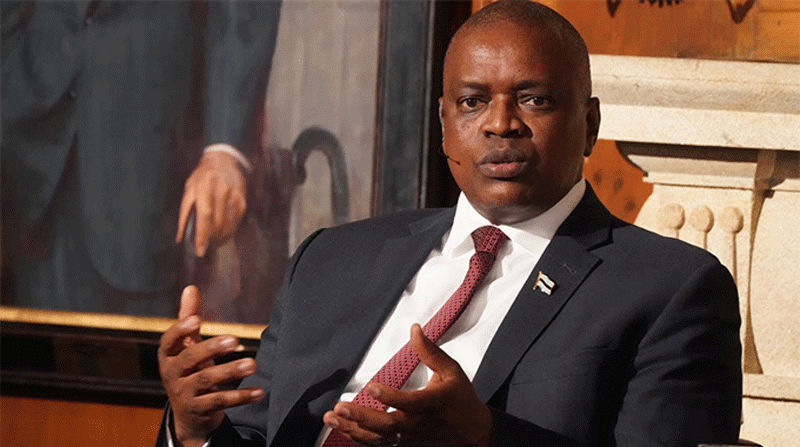
I perfectly understand that life in the ivory tower of power and wealth is so lavish and comfortable!
I am similarly aware that — living an opulent lifestyle, always dining and wining on the most exquisite and delectable expensive gourmets, champagne and wine — can easily divorce people from the real world.
As such it comes as no surprise at all that, the visiting Botswana President Mokgweetsi Masisi — in the midst of VVIP (very very important person) treatment he is being treated to by his Zimbabwe counterpart, President Emmerson Mnangagwa, at taxpayers' expense — has shamefully utterly failed to speak up for the same taxpayers, who are enduring indescribable poverty and subjugation, at the hands of his host.
What are we to expect from those who have spent most of their lives living in ivory towers, with silver spoons in their mouths — who now believe that the impoverished and oppressed do not matter, and are a mere nuisance — such that, raising such “insignificant” matters, in the midst of being driven around in motorcades, is an unnecessary inconvenience, and “disrespectful” to those hosting them?
Today, Masisi was taken around the capital Harare, visiting the National Heroes Acre — where, ironically, he was told about the repressive policies of “evil and arrogant white colonists”, who ruthlessly subjugated and discriminated against the country's black majority, and who had to be militarily removed by the gallant men and women laid at the shrine.
Of course, for the ruling elite, now disconnected from the life of the ordinary man, woman, and child on the street — after decades of living in comfort, leisure and power — I am quite sure that it never dawned on him, not even for a bit, that the same “black majority” were still oppressed and marginalised but, this time around, by their former liberators turned new “evil and arrogant black colonists”.
This glaring contradiction obviously never entered his mind.
Maybe, if it had been four, five or six decades ago — when today's ruling elite was also alienated and treated like second-class citizens in their own countries (well before they entered the corridors of power and wealth) — he may have stood with the black majority, since he would have also been feeling the pain.
- Zim headed for a political dead heat in 2023
- Record breaker Mpofu revisits difficult upbringing
- Tendo Electronics eyes Africa after TelOne deal
- Record breaker Mpofu revisits difficult upbringing
Keep Reading
Maybe, again, that is why these people in power today, cannot stop telling everyone who dares to listen — or, those who do not even want to listen, but once they switch on State-controlled media, they are immediately bombarded with these stories — because that was the time, they too, were living in poverty and indignity.
Now that they are enjoying a life of the rich and famous — only comparable to those in the most luxurious parts of the world, such as Sandton (South Africa), or Beverly Hills (United States) — they are completely incapable of noticing, or unwilling to notice, that ordinary people’s struggles and oppression never ended at independence from colonial rule.
If they did, then a simple visit to Mbare, Mabvuku, Highfield, Budiriro, Warren Park, and then turning right straight into the Heroes Acre — would have told Masisi that life under “independent” Zimbabwe had not improved the wellbeing and welfare of the majority.
In fact, most — especially, those who lived through the colonial era — can attest to the fact that life has actually worsened.
So, before showering the Mnangagwa regime with baseless and meaningless praises — and, lamely parroting the senseless “sanctions against Zimbabwe” drivel — Masisi should have questioned his counterpart the real reasons he and his colleagues are failing to uplift the lives of ordinary Zimbabweans.
Did he even wonder how much a country endowed with nearly 60 identified precious minerals was earning — with lithium, gold, platinum, and diamonds so far headlining Zimbabwe’s economy — and, where all those billions of dollars were going?
Or, maybe he already knows — considering that he spent most his time in Zimbabwe being accompanied by the country’s ruling elite — obviously, being exposed to the extravagance of their lavish lifestyles, while the majority of Zimbabweans wallow in abject poverty, and anyone who dares speak up, being ruthlessly persecuted.
Perhaps, according to Masisi’s impassioned speech on the liberation struggles against brutal repression in both Botswana and Zimbabwe — and, how they were intertwined — the best thing for him to do should have also been to take a visit to see Job Sikhala, and numerous others languishing in prison, without trial, and consistently denied their constitutional right to bail.
Would the Botswana president be able to distinguish between life in colonial Rhodesia and “independent” Zimbabwe?
So, before making noise about the so-called sanctions supposedly imposed on the country (a few top officials and entities can never legitimately be regarded as a “country”) — I strongly believe he should be more concerned about the over 7,1 million (half the population) living in extreme poverty (on less than US$1,90 a day), and 80 percent earning below the poverty datum line.
He should be more worried about those not accessing healthcare (due to non-maintenance of public facilities, and lack of crucial treatment) — who have to endure the indignity of being berated by officials from neighbouring countries, where they are forced by dire circumstances to seek medical assistance.
In fact, does Botswana not have a sizeable Zimbabwean population seeking decent livelihoods there.
I wonder if he has ever bothered speaking with them, in order to understand what led them to leave their own homes, families and friends.
I would not count on it!
These are the people we can justifiably call “the country” — yet, who have largely remained invisible to our visiting heads of States, such as Masisi — whom, we would like to believe, have influence over our leaders.
Zimbabweans are sick and tired of African leaders, who never stop talking about colonialism and the liberation struggle — yet, never give a hoot about the millions still languishing in oppression and poverty in our “independent” countries.
- Tendai Ruben Mbofana is a social justice activist, writer, researcher, and social commentator.
- Please feel free to contact him on WhatsApp/Call: +263715667700 / +263782283975, or Calls Only: +263788897936, or email: [email protected].









